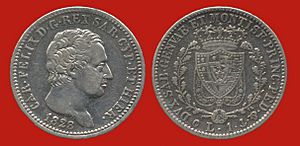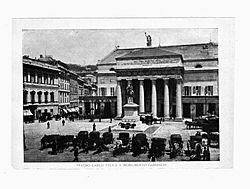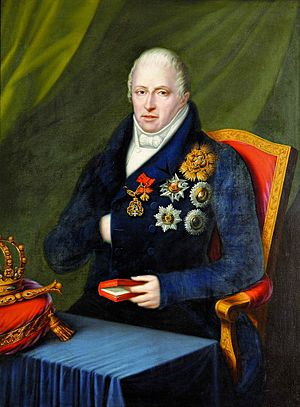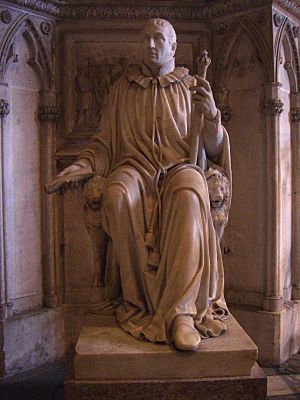Charles Felix of Sardinia facts for kids
Quick facts for kids Charles Felix |
|||||
|---|---|---|---|---|---|
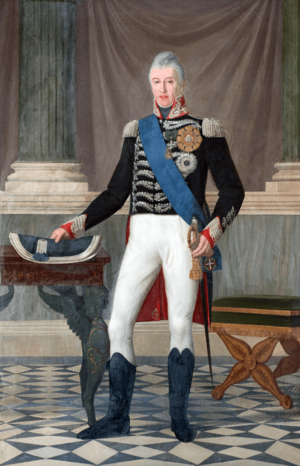
Portrait by Giacomo Berger (1816)
|
|||||
| King of Sardinia and Duke of Savoy | |||||
| Reign | 12 March 1821 – 27 April 1831 | ||||
| Coronation | 25 April 1821 | ||||
| Predecessor | Victor Emmanuel I | ||||
| Successor | Charles Albert | ||||
| Born | 6 April 1765 Royal Palace, Turin, Kingdom of Sardinia |
||||
| Died | 27 April 1831 (aged 66) Palazzo Chiablese, Turin, Kingdom of Sardinia |
||||
| Burial | 28 April 1831 Hautecombe Abbey, Saint-Pierre-de-Curtille |
||||
| Spouse | |||||
|
|||||
| House | House of Savoy | ||||
| Father | Victor Amadeus III of Sardinia | ||||
| Mother | Maria Antonia Ferdinanda of Spain | ||||
| Religion | Roman Catholicism | ||||
| Signature | |||||
Charles Felix (Italian: Carlo Felice Giuseppe Maria; born April 6, 1765 – died April 27, 1831) was a ruler from the House of Savoy. He served as the Duke of Savoy, Piedmont, and Aosta. He also became the King of Sardinia from 1821 until his death in 1831.
Contents
Early Life of Charles Felix
Charles Felix was born in Turin, a city in Italy. He was the eleventh child and fifth son of Victor Amadeus III, who was the King of Savoy, and Maria Antonia Ferdinanda of Spain. His grandparents included Charles Emmanuel III of Sardinia and Polyxena of Hesse-Rotenburg. His other grandparents were King Philip V of Spain and Elisabeth Farnese.
Charles Felix had two older brothers who also became rulers: Charles Emmanuel IV of Sardinia and Victor Emmanuel I of Sardinia. He spent his childhood at the Castle of Moncalieri with his sister, Maria Carolina, and his younger brother, Giuseppe Benedetto Placido.
People described Charles Felix as a complex person. He was very firm and didn't change his mind easily. He could be private and didn't trust others easily. However, he was also honest and caring. He believed that kings had a special, almost sacred, right to rule.
During the French Revolution and the Italian Campaign, Charles Felix was part of a group that disagreed with his brother, King Charles Emmanuel IV. He started writing a personal diary during this time. This diary is a valuable source of information about his life and the events of that period.
Viceroy of Sardinia (1799-1814)
Charles Emmanuel IV, Charles Felix's brother, had no children. After his wife died, he decided to step down as king in 1802. His brother, Victor Emmanuel I, became the new king. However, Victor Emmanuel I chose not to live in Sardinia himself. Instead, he appointed Charles Felix as the Viceroy (a ruler acting for the king) of Sardinia.
Charles Felix ruled Sardinia in a very strict way. The island had been experiencing a lot of problems and crime since 1794. Charles Felix worked hard to bring order, even if it meant being very harsh. He once wrote that strong action was needed for the good of everyone. Because of his strict rule, some people in Sardinia called him "Carlo Feroce," meaning "Charles the Ferocious."
He set up special courts to deal with political issues and crime. He gave a lot of power to the police to investigate and stop problems. However, he also tried to improve things. He worked to control the power of local officials and corrected some unfair practices of the feudal system. For example, he pushed for poorer people to be exempt from certain taxes. He also often sided with the common people in disputes against powerful feudal lords.
Despite the difficult situation, Charles Felix helped improve farming and the economy in Sardinia. He created groups to support agriculture and manage mines and forests. He also encouraged olive farming and made trade agreements to help local businesses. He even started a project to build better roads across the island.
Marriage and Return to Turin (1814-1821)
On March 7, 1807, Charles Felix married Maria Cristina of Naples and Sicily in Palermo. She was the daughter of Ferdinand I of the Two Sicilies, the King of Naples and Sicily.
This marriage was arranged for important family reasons. Neither Charles Felix's brothers, Charles Emmanuel nor Victor Emmanuel, had sons who lived. This meant Charles Felix was next in line to the throne. He needed to have a son to continue the family line.
Although Charles Felix and Maria Cristina had a happy marriage, they were unable to have children. This meant that Victor Emmanuel had to consider Charles Albert of Sardinia, a cousin from another branch of the family, as the next in line to the throne.
After Napoleon was defeated, Victor Emmanuel returned to Turin in 1814. Charles Felix joined him briefly. He then returned to Sardinia the next year with his wife. He officially remained Viceroy until 1821, but he spent more time at the court in Turin.
Revolution of 1821
The Start of Trouble
In 1820, revolts in Spain led to their king agreeing to a new constitution. This inspired people in many other European countries to want similar changes from their own rulers. Soon, protests began in places like Naples and Palermo.
In Turin, the capital of Sardinia, signs of trouble appeared on January 11, 1821. Four students were arrested at a theater for wearing red caps with black bows. These were symbols of a secret society called the Carbonari, who wanted political change. The students resisted arrest, causing a large fight.
The next day, many students and teachers protested, demanding the release of the arrested youths. When their demands were refused, they barricaded themselves inside the university. The government had to call in the army. Many people were injured, and the situation became very tense.
The protestors were connected to a secret group called the "Federati." Their leaders, including important soldiers and officials, met with Charles Albert, who was a prince. They hoped Charles Albert would support their plan to bring reforms and possibly declare war on Austria.
The conspirators did not want to get rid of the House of Savoy. Instead, they wanted the royal family to make political and social changes. They planned to gather the army, surround the king's home, and force him to agree to a constitution and declare war on Austria. Charles Albert was supposed to help by talking to the king. However, the next morning, he changed his mind and tried to distance himself from the group.
The King Steps Down
On March 11, 1821, King Victor Emmanuel I met with his advisors, including Charles Albert. The king was unsure what to do, so no action was taken.
The next day, March 12, rebels took control of the Citadel of Turin. Victor Emmanuel asked Charles Albert to talk with the Carbonari, but they refused to listen. That evening, as the military uprising spread, the king decided to step down. He gave up his throne in favor of his brother, Charles Felix. Since Charles Felix was in Modena at the time, Charles Albert was made regent, meaning he would rule temporarily.
The king's decision to step down caused a lot of confusion. It created a problem for the royal family that other countries would notice. It also divided the army and government, making it hard to keep order.
As regent, Charles Albert tried to take control by forming a new government. He also tried to talk with the rebels, but he couldn't achieve anything. He sent a letter to Charles Felix, explaining what had happened and asking for instructions. However, the letter took a long time to arrive.
Fearing the anger of the people, Charles Albert signed a decree on March 13, 1821. This decree granted a constitution, similar to the one in Spain. However, it would only become law if the new king approved it. The next day, the regent formed a special council to protect the parliament. Two days later, he swore to follow the new constitution.
Charles Felix Takes Action
When Charles Felix finally received the letter about his brother stepping down, he decided to act. He told the messenger not to call him "majesty." He then declared that his brother's abdication was not valid because it was forced. He also sent a message to Charles Albert, telling him to go to Novara immediately and wait for his orders.
Regarding the new constitution, Charles Felix declared that any actions taken after his brother's abdication were invalid. He then issued a strong statement: "We consider all royal subjects who have helped the traitors or who have dared to announce a constitution to be rebels."
Charles Albert, feeling very discouraged, followed Charles Felix's orders. He went to Novara and announced that he was giving up his role as regent. He told everyone to obey Charles Felix. A few days later, Charles Felix ordered him and his family to leave for Florence.
With Charles Albert out of the way, Charles Felix wrote to the Emperor of Austria, Francis I, asking for troops to stop the revolt.
On April 3, Charles Felix issued another statement. He offered a pardon to soldiers but announced strict punishments for rebel officials. This made it impossible for any compromise to be reached. Even powerful leaders like Metternich thought Charles Felix's statement was too harsh.
The rebels, realizing they had no other choice, marched towards Novara. There, forces loyal to Charles Felix were waiting. This convinced Austria to intervene. On April 8, a battle took place. Austrian troops occupied several cities, and Charles Felix's loyal forces took control of Turin on April 10.
Despite pressure from other emperors, Victor Emmanuel confirmed his decision to step down on April 19. Charles Felix, who disliked the idea of becoming king because of the rebels, finally took the throne on April 25.
Stopping the Rebellion
Once Turin was back under control, Charles Felix, who was still in Modena, spoke directly with the Emperor of Austria. He wanted to make sure that he would have full control as an absolute monarch and that Austria would not interfere in his lands.
Charles Felix was determined to stop the "revolutionary spirit." He believed it was his duty to suppress any ideas of change. He stayed in Modena and appointed others to manage the kingdom's affairs.
He then began to suppress the opposition. He set up three different courts to investigate and punish those involved in the revolt. These courts issued many sentences, including death sentences, but only two people were actually executed. Many officers were dismissed from the army.
The courts also investigated civil servants and professors. Many were dismissed or suspended. The University of Turin was even closed for a time. Charles Felix believed that many people at the university were "corrupt" and that the professors were "detestable."
Despite the strict atmosphere, Charles Felix did not stop people from fleeing the country. It is even said that he secretly sent money to the families of those who had been exiled. The suppression ended on September 30, 1821, when Charles Felix issued a pardon for most people involved in the revolt, except for the leaders and those guilty of serious crimes. A few days later, Charles Felix finally entered Turin.
King of Sardinia (1821-1831)
Even before he arrived in Turin, Charles Felix went back on the promises made by the regent. To help restore order, he called in Austrian troops, who stayed in Piedmont until 1823. In that same year, Charles Albert went to Spain to help put down a revolt there. This made him unpopular with those who wanted change in Italy, but it helped him regain the king's trust.
Charles Felix was a very traditional ruler. He believed that the changes brought by the French Revolution and Napoleon Bonaparte were wrong. He called Napoleon "the rascal."
Internal Policies
Charles Felix did not spend much time in Turin as king. He didn't enjoy the social life of the capital. He had never really wanted to be king, and he didn't have much affection for the people of Turin. He felt they had betrayed the royal family by supporting Napoleon and demanding a constitution.
He usually only stayed in Turin during the theater season. The rest of the time, he traveled around Savoy, Nice, and Genoa (which was one of his favorite places). He also spent time at the castles of Govone and Agliè.
Because he traveled so much, the king often let his ministers handle many decisions. However, he still kept an eye on things. He understood that some reforms were needed. He worked to protect his kingdom from interference by the Church and other countries. He limited the special rights of the Church that seemed harmful to the state. For example, he almost completely ended the right of sanctuary in holy places. This meant that criminals could not hide in churches to avoid arrest. He also allowed regular courts to hear cases against priests.
Charles Felix also made important changes to the laws. In 1822, he reformed laws about mortgages and military justice. He also reformed the court system. These changes led to the "Civil and Criminal Laws of the Kingdom of Sardinia," signed in 1827. This new set of laws replaced older, outdated ones.
The most important changes were in criminal law. He abolished cruel punishments like quartering (cutting a body into pieces). He also limited the use of the death penalty. He made sure that the punishment fit the crime. He also made a clear difference between trying to commit a crime and actually committing one.
Finally, Charles Felix abolished the slave trade. He declared that any person found enslaved on a ship flying the Sardinian flag would immediately be set free.
Economic Improvements
Charles Felix's reign faced some financial challenges, and he favored strict trade protection. However, he also started many projects to improve public services and works.
The road network was made better. A new road was built between Cagliari and Sassari in Sardinia (now called Strada statale 131 Charles Felix). Roads were also improved between Genoa and Nice. New bridges were built over the Bormida and the Ticino rivers. Many public buildings were constructed in cities. The port of Nice was greatly improved. Genoa received a new theater, which was named the Teatro Carlo Felice after the king. Turin also saw many improvements, including a new bridge, a new public square (the Piazza Carlo Felice), and new drainage systems.
Charles Felix also paid attention to industries like steelmaking. He improved the banking and insurance sectors. He created the Cassa di Risparmio di Torino (a savings bank) in 1827 and the Royal Mutual Society of Insurers in 1829. He encouraged farming and manufacturing by offering tax breaks and benefits. He also created trade fairs, like one in 1829 that had 500 exhibitors.
Foreign Policy
Charles Felix was interested in expanding his kingdom, but he was also practical. He focused on the economic and trade interests of his realm. In 1821, he signed a good trade agreement with the Sublime Porte (the government of the Ottoman Empire).
In September 1825, he showed his strength to the Bey of Tripoli. He wanted the Bey to follow a treaty and respect Sardinian ships sailing along the coast of North Africa. Sardinian warships appeared off the coast of Tripoli. After diplomatic talks failed, Sardinian boats entered the harbor and set fire to some Tripolitanian ships. This action forced the Bey to be more cooperative.
In 1828, he finished building a bridge over the River Ticino. This bridge connected his territory with the Austrian-controlled Kingdom of Lombardy–Venetia.
Support for Arts and Culture
Charles Felix loved art and culture and supported them greatly. In 1824, he bought Hautecombe Abbey, where many of his ancestors were buried. He then hired an architect to restore the abbey.
In the same year, he bought a large collection of ancient Egyptian artifacts. These pieces now form a major part of the Museo Egizio (Egyptian Museum) in Turin. The collection was placed in the Palazzo dell'Accademia delle Scienze, where the museum is still located today.
In 1827, Charles Felix also created a chamber of commerce and a school for studying old writings and diplomacy.
Death and Succession
Charles Felix died without any children on April 27, 1831, in Turin. He passed away at the Palazzo Chiablese, which his sister had given to him. He had reigned for ten years. He was buried at Hautecombe Abbey in Savoy, where his wife was also buried later. With his death, the main line of the House of Savoy ended.
He was succeeded by Charles Albert of Sardinia (1798-1849), who was the most senior male member of the Savoy-Carignano family branch. Charles Felix had not wanted Charles Albert to be his successor. This was because Charles Albert seemed open to new, liberal ideas and was friendly with the Carbonari.
Legacy
The Teatro Carlo Felice in Genoa, a famous theater, is named after him.
The main road on the island of Sardinia, the Strada statale 131 Carlo Felice, is also named for him. This road connects the towns of Cagliari and Sassari-Porto Torres and was built in the 19th century.
Images for kids
-
Victor Emmanuel I of Sardinia, who stepped down as king in favor of Charles Felix after the 1821 rebellion
See also
 In Spanish: Carlos Félix de Cerdeña para niños
In Spanish: Carlos Félix de Cerdeña para niños


